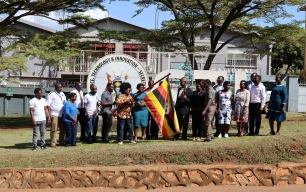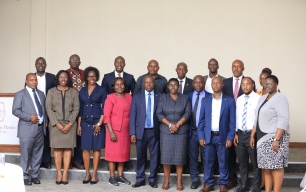Busitema University and Mbale Clinical Research Institute Lead Study on the Association between Malaria and Climate Change in Eastern and North-Eastern Uganda.

Busitema University in collaboration with the Mbale Clinical Research Institute (MCRI), is spearheading a critical study on the Development of Geospatio-Temporal Surveillance and Characterization of Malaria in the Changing Climatic Conditions in Eastern Uganda (GTS-MACS), a study that has already yielded some noteworthy findings. Professor Peter Olupot-Olupot from Busitema University, who leads the project, recently hosted a dissemination meeting to share these results and engage stakeholders in the discussion of two new curricula developed under the project's capacity-building component with the Vice Chancellor of Busitema University, Professor Paul Waako, as the chief guest at this significant event.
The GTS-MACS project aims to explore the epidemiology of malaria and the potential emergence of drug resistance in the context of evolving climatic conditions in Eastern and Northeastern Uganda. Recognizing the lack of comprehensive data on how climatic variability affects malaria epidemiology in Uganda, this study seeks to bridge this gap by examining how temperature, rainfall, and humidity influence malaria transmission and identifying any markers of resistance to current antimalarial drugs. The project also aspires to generate data that will be instrumental in shaping targeted interventions and disease control policies.
One of the project's primary objectives is to conduct geospatial-temporal surveillance of malaria. This aspect of the project has been completed, resulting in a detailed malaria epidemiological map that highlights the patterns and distribution of the disease in relation to climatic factors such as temperature, rainfall, and humidity. This map serves as a crucial tool for understanding how climatic elements drive malaria transmission and helps in pinpointing areas that require targeted interventions. Another key objective of the project is to detect molecular markers of artemisinin resistance in Eastern Uganda. The study has made significant progress in the laboratory analyses, with preliminary data hinting at emerging patterns of resistance. These findings will be crucial for developing strategies to combat drug-resistant malaria strains.
The project also focuses on determining the time required to achieve complete parasite clearance in children treated with Artemisinin-based Combination Therapies. Similarly, this objective is nearing completion, with data collection and preliminary analyses already finalized. The final steps involve validating the data and reporting the findings, which will provide insights into parasite clearance rates, tolerance levels, and implications for treatment protocols.
In addition to these scientific objectives, the GTS-MACS project has prioritized capacity building by developing two new curricula; a postgraduate curriculum on clinical and health research methods and an undergraduate curriculum on environmental health. These curricula have been thoroughly reviewed and refined through presentations and discussions at various levels, including feedback from stakeholders with the final versions a set to be presented to stakeholders.
As portrayed in the GTS-MACS project report, the dissemination of the project's preliminary findings has been conducted through several avenues. Regular meetings with the investigators' team from December 2023 to May 2024 provided a platform for ongoing discussions and updates. Additionally, an online dissemination event was held on March 15, 2024, which allowed researchers, healthcare providers, and policymakers to engage with the preliminary findings and discuss their implications. The project’s findings were also shared at the First Africa-Russia International Conference on the Fight Against Infectious Diseases, held in Kampala, Uganda, from April 17 to 19, 2024. The conference, organized under the theme "Towards Sustainable Response to Emerging & Re-emerging Infectious Diseases in Africa," provided a significant platform for the GTS-MACS team to present their research and receive valuable feedback.
Furtherstill, the GTS-MACS project team plans to disseminate their data through various channels, including publications, conferences, seminars, and scientific meetings. They will also be writing new research protocols and networking to further studies on climate change and malaria in Uganda.
The GTS-MACS project represents a pivotal step in understanding and combating malaria amidst changing climatic conditions. The research findings of this project have the potential to significantly influence disease control policies and interventions, ultimately contributing to the reduction of malaria prevalence in Uganda and beyond.
- 327 views




